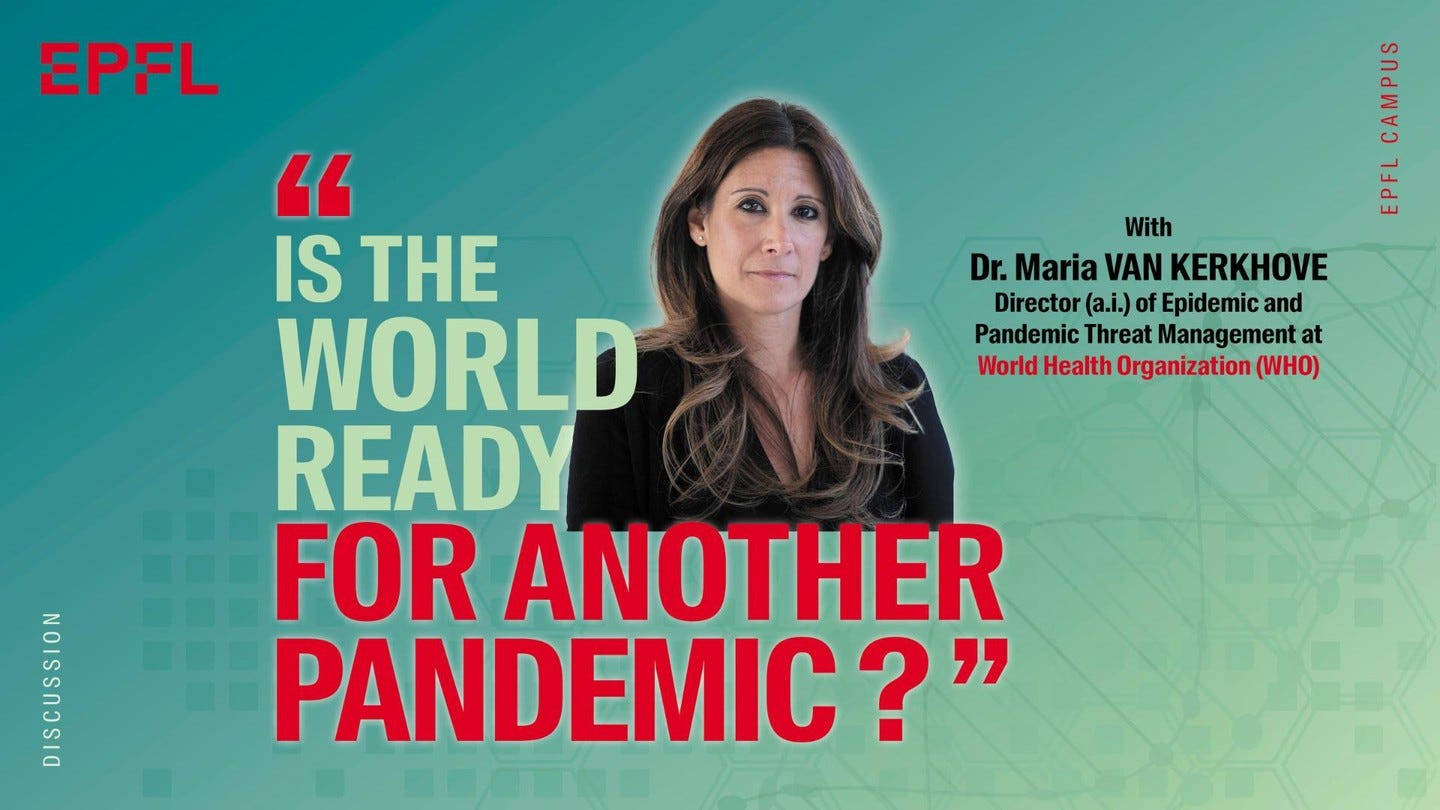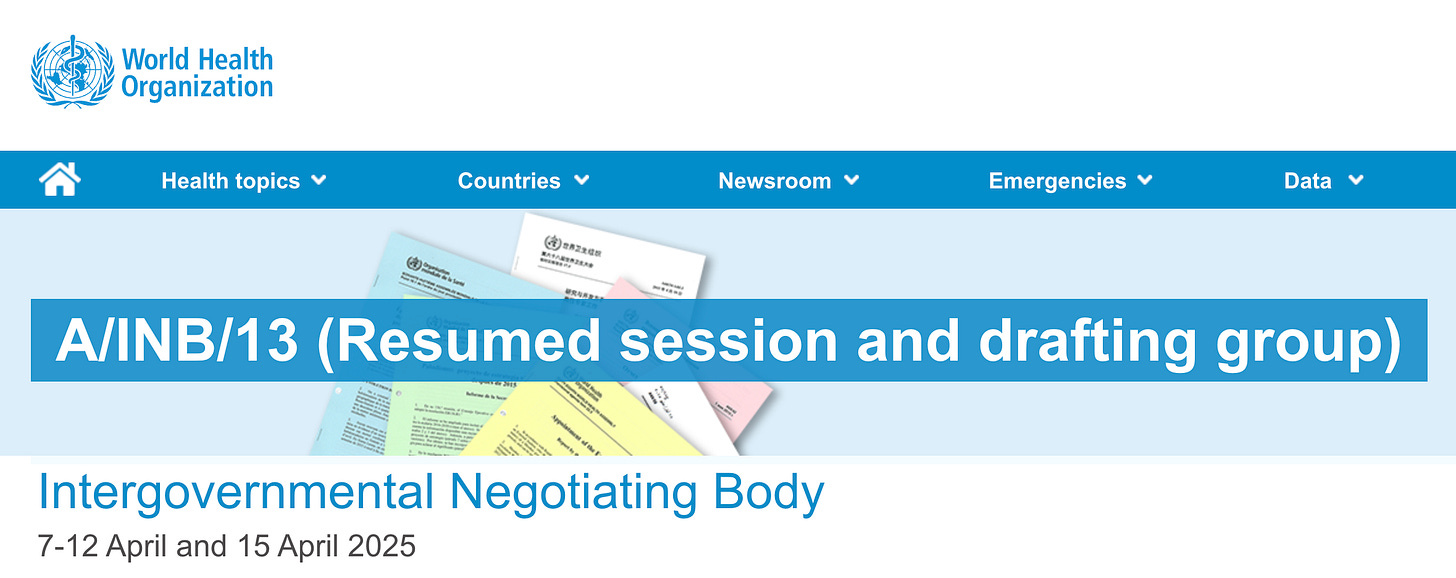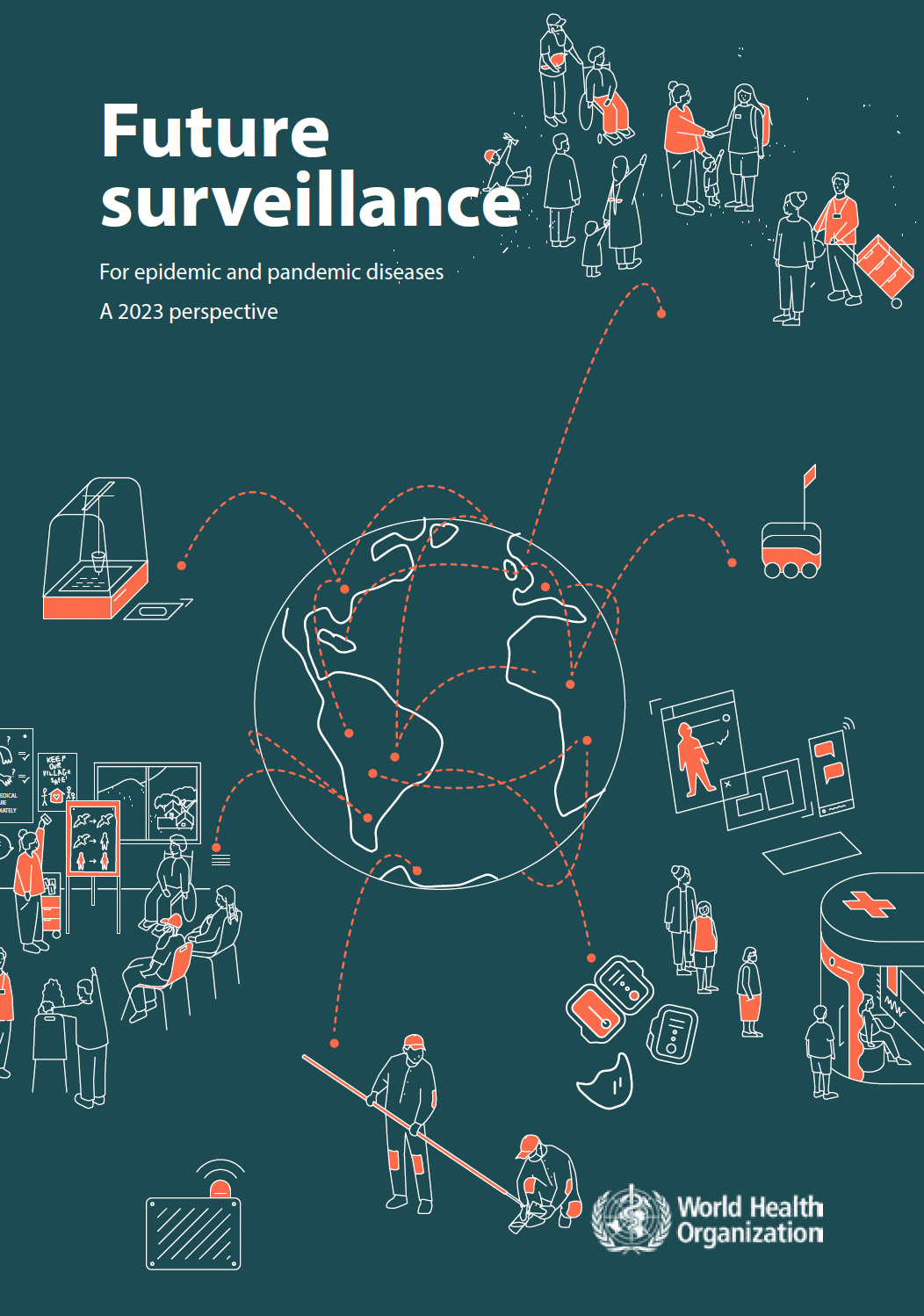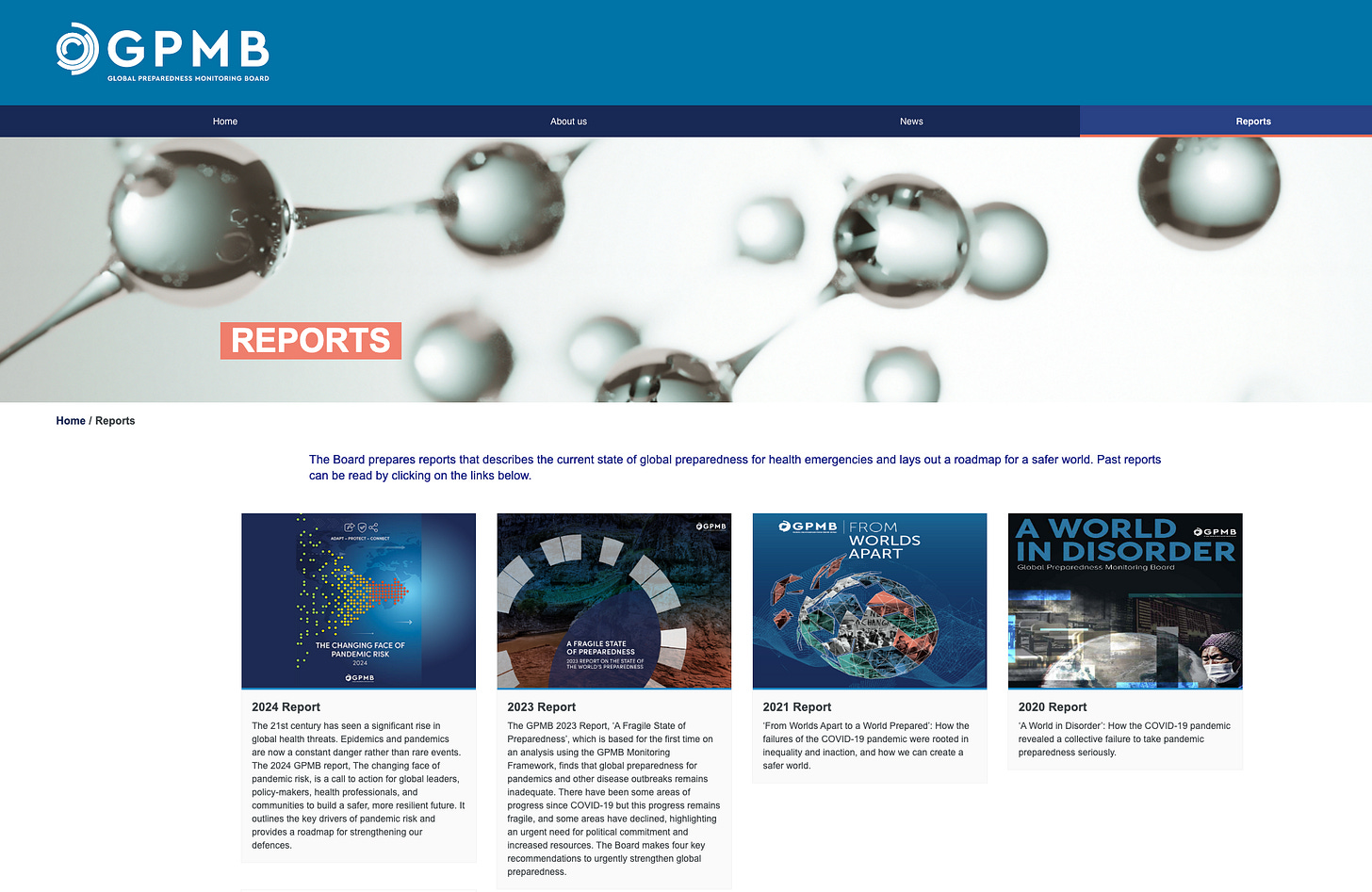Are YOU ready for the next pandemic?
Two renowned experts, WHO's Dr. Van Kerkhove and EPFL's Prof. Fellay, addressed critical pandemic preparedness and response strategies during their hour-long discussion on global health security.
On Monday April 14th, 2025, the EPFL university campus in Lausanne, Switzerland, hosted an hour-long conversation entitled ”Is the World Ready for Another Pandemic," between WHO's Director of Epidemic and Pandemic Threat Management, Dr. Maria Van Kerkhove and Swiss Professor of Genomic Medicine and Infectious Diseases, Jacques Fellay.
Prof. Fellay is the Head of an EPFL lab bearing his name, specialising in Human Genomics of Infection and Immunity. He was also a member of the Swiss National COVID-19 Science Task Force—disbanded in March 2022—who provided the Swiss public health authorities with scientific advice, and prepared policy briefs during COVID-19.
The conversation between Dr. Van Kerkhove and Prof. Fellay could be summarised as follows:
A Pandemic Agreement that is legally-binding is essential! Without it we will NOT be prepared for the next pandemic. And as we’ve been reminded many, many times before, it’s not “if”, but “when” there is a next pandemic—WHO’s Director-General Tedros Adhanom Ghebreyesus has assured us that it is “an epidemiological certainty.” Dr. Van Kerkhove supports this and shares that it will most likely be an influenza outbreak—from an animal spillover event or a lab-leak, no one knows…
With the retreat of funding (EU budget shifts to defense and the USA’s intent to withdraw), the WHO will cut 25% of their staff and dramatically streamline their operations. Financing pandemic prevention, preparedness, and response (PPPR)—entailing equitable access to medical countermeasures, global genomic surveillance, international collaboration and a One Health approach—should be member states’ number one priority as “health is defense."
The infodemic of misinformation, disinformation and the general crisis in confidence is acknowledged as detrimental to public health and pandemic management, with Prof. Fellay declaring that “disinformation kills faster than viruses.”
In conclusion, the world is nowhere near ready for the next pandemic, but according to Dr. Van Kerkhove, populations worldwide will be safer and better prepared as soon as the Pandemic Accord is agreed upon and implemented. And of course, it requires billions of dollars from member states to do so.
Remember that COVID-19 policies (NOT the virus) cost well over US$16 trillion worldwide in economic loss, removed 1.6 billion children from school, and pushed an additional 150 million people into extreme poverty. Millions of people lost their jobs, shut down their businesses and were driven into debt—and logically this resulted in deteriorating mental health, especially in younger generations.
Dr. Van Kerkhove states that COVID-19 caused more than 20 million deaths worldwide, while also highlighting that around 20 million lives have been saved thanks to what she claims are “highly safe and effective vaccines.”
Our World In Data quotes a death toll closer to seven million lives lost due to COVID-19, and as for “highly safe vaccines”—it only further erodes trust when top officials continue to consistently deny and downplay damage, despite mounting evidence of harm.
On a side bar, speaking of evidence of harm, it is worth commenting on Dr. Peter Marks, formerly of the US FDA, who was made aware of the numerous neurological injuries following COVID-19 injections, from clinical trial participants! Despite first hand knowledge, and following at least seven zoom calls with victims, Dr. Marks insists that the FDA can only act upon “the data.” Check out the documentary below, to be released on May 6th, 2025.
Back to the discussion…
Dr. Van Kerkhove observes that while COVID-19 may seem like a distant memory for many, people are suffering from a sort of post-traumatic “collective amnesia.” However, public health authorities have not forgotten and are intent on legislating PPPR into international law to strengthen global health governance—the key highlights of this Pandemic Agreement being:
A One Health approach: taking into account the interface between humans, animals and the environment (under Article 5).
Genomic surveillance: expanding PCR and sequencing capacities worldwide (Articles 9, 10, 12).
A Pathogen Access and Benefit-Sharing System (PABS) that will help ensure equitable access to medical countermeasures (under Article 12).
Equitable access to diagnostics, therapeutics and vaccines: enabled through technology transfers (under Articles 9, 10, 11, 13).
While one may ponder what mass genomic surveillance can actually tell us about disease prevention and the diagnostic reliability of a PCR test using a cycle threshold (CT) of 40 and above, the PABS system—one of the “trickiest parts to negotiate”—may very well indirectly contribute to the next pandemic by making pathogenic sequences readily available the world over. According to the Johns Hopkins Center for Health Security:
“The proposed inclusion of PABS in a pandemic accord represents a pivotal opportunity to establish a legal obligation for sharing pathogen samples and sequences, balanced with equitable sharing of benefits, ensuring justice and global health security.”
Dr. Van Kerkhove assures the public that the adoption of a new legal instrument would benefit all of humanity and build resilience in the face of the next global infectious disease outbreak. She has been involved in numerous meetings on the legally-binding Pandemic Agreement, or Treaty, or Convention, which has been in discussion for the last three years. With the most recent negotiations taking place last week in Geneva (April 7th to 11th, 2025), additional sessions were planned on Tuesday 15th April.
One hundred and ninety two WHO member states—excluding the US and Argentina who have expressed their “intent to withdraw”—together with non-state actors participated in the most recent meetings, working late into Friday night. Though exhausted and delirious by Saturday morning, the representatives were elated that significant progress had been made.
By Wednesday 16th April, at 3am, “bleary-eyed negotiators” had finally reached an agreement on the draft to be submitted at this year’s World Health Assembly, though “details of the PABS system still need to be agreed on.”
A WHO statement issued after the close of the meeting stressed that the agreement: “affirms the sovereignty of countries to address public health matters within their borders, and provides that nothing in the draft agreement shall be interpreted as providing WHO any authority to direct, order, alter or prescribe national laws or policies, or mandate States to take specific actions, such as ban or accept travellers, impose vaccination mandates or therapeutic or diagnostic measures or implement lockdowns.”
– Health Policy Watch
If the legally binding draft developed by the INB is adopted by majority vote under Article 19 of the WHO Constitution at the 78th WHA, then individual member states will have to ratify the treaty before its implementation.
While the public is not privy to all the Intergovernmental Negotiating Body (INB) gatherings on the Pandemic Accord between member states and non-state actors, the public can watch some of the sessions online.
Check out the link below for the most recent publicly available version of the draft, dated Wednesday April 16th, 2025.
Investing in research to better understand what actually makes people healthy and how we build natural immunity is not high on the WHO’s agenda, though Dr. Van Kerkhove eludes to this work being financed.
The general public will have to wait and see what final decisions are made at this year’s WHA. Commuting between the opulent 5-star InterContinental hotel, its luxurious restaurants and the newly renovated WHO headquarters—whose modernization has cost approximately CHF 240 million—numerous global representatives will convene from May 19th to May 27th, 2025, to make decisions that affect us all, all under the guise of safeguarding public health and preventing the next pandemic…
If you have time to dig a little deeper, below are some additional resources to watch and to read.
For a peak into the INB Pandemic Agreement proceedings, check out Part One and Part Two. It is definitely not exciting to watch—even Dr. Van Kerkhove admits to the process being bureaucratic and painfully boring—but educative nonetheless…
For an in-depth interview with Dr. Maria Van Kerkhove, filmed in November 2023, watch the 40-minute timestamped video below.
Two illustrated and illuminating reports, published by the WHO in 2022 and 2023 respectively, outline the global strategy and approach to pandemic prevention, preparedness and response.
The Global Preparedness Monitoring Board also has published several reports since 2019, the most recent one dated October 14th, 2024.
The Geneva Graduate Institute is also an important resource for information on the WHO’s policies and international law.

















